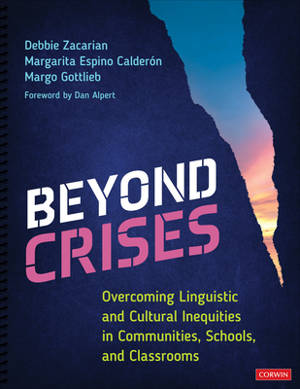
- Afhalen na 1 uur in een winkel met voorraad
- Gratis thuislevering in België vanaf € 30
- Ruim aanbod met 7 miljoen producten
- Afhalen na 1 uur in een winkel met voorraad
- Gratis thuislevering in België vanaf € 30
- Ruim aanbod met 7 miljoen producten
Zoeken
Beyond Crises
Overcoming Linguistic and Cultural Inequities in Communities, Schools, and Classrooms
Debbie Zacarian, Margarita Espino Calderon, Margo Gottlieb
Met spiraalrug | Engels
€ 51,95
+ 103 punten
Omschrijving
What are some lessons learned from the pandemic? We learned that, in times of crises, the humanitarian needs of students, families, and ourselves must be a top priority. We learned that forming effective partnerships with families and communities is essential to the health and well-being of our children. We were offered a blunt reminder that a system designed to serve the interests of a privileged few was destined to fail our historically underserved students, especially our millions of multilingual learners. Above all, we learned that the "normal" many of us have yearned for was never good enough--that we must envision a "better world," where we build on our multilingual students' unique assets and cultivate their inner brilliance. Only then will we deliver on their promise. It's this "better world," a world in which communities, schools, and classrooms work together as a "whole-child ecosystem," Beyond Crises: Overcoming Linguistic and Cultural Inequities in Communities, Schools, and Classrooms sets out to create. Taking a look from the outside in, Debbie Zacarian, Margarita Calderón, and Margo Gottlieb address three critical arenas: 1. Imagining Communities describes how to design and enact strengths-based family and community partnerships, including the critical importance of identifying, valuing, and acknowledging each member's assets and competencies, and the ways recent crises have amplified their struggles. 2. Imagining Schools takes an up-close look at policies, structures, and now irrelevant ways of schooling that call for change and how we might reconfigure professional development to ensure every teacher and administrator is dedicated to the well-being and success of our multilingual learners. 3. Imagining Classrooms demonstrates how to optimize learning opportunities--both virtual and face-to-face--so our diverse students grow cognitively, linguistically, and social-emotionally, and accentuate their talents in knowing and using multiple languages in linguistically and culturally sustainable environments. "Student and family, classroom, school, and local community are not silos unto themselves," Debbie, Margarita, and Margo insist. "They are part of a larger whole that is interrelated and interconnected and, even, interdependent on each other. By forming stronger alliances, we can realize the power of truly working, socializing, and flourishing together." Beyond Crises is the first critical step forward.
Specificaties
Betrokkenen
- Auteur(s):
- Uitgeverij:
Inhoud
- Aantal bladzijden:
- 256
- Taal:
- Engels
Eigenschappen
- Productcode (EAN):
- 9781071844649
- Verschijningsdatum:
- 10/03/2021
- Uitvoering:
- Met spiraalrug
- Afmetingen:
- 216 mm x 274 mm
- Gewicht:
- 771 g

Alleen bij Standaard Boekhandel
+ 103 punten op je klantenkaart van Standaard Boekhandel
Beoordelingen
We publiceren alleen reviews die voldoen aan de voorwaarden voor reviews. Bekijk onze voorwaarden voor reviews.











